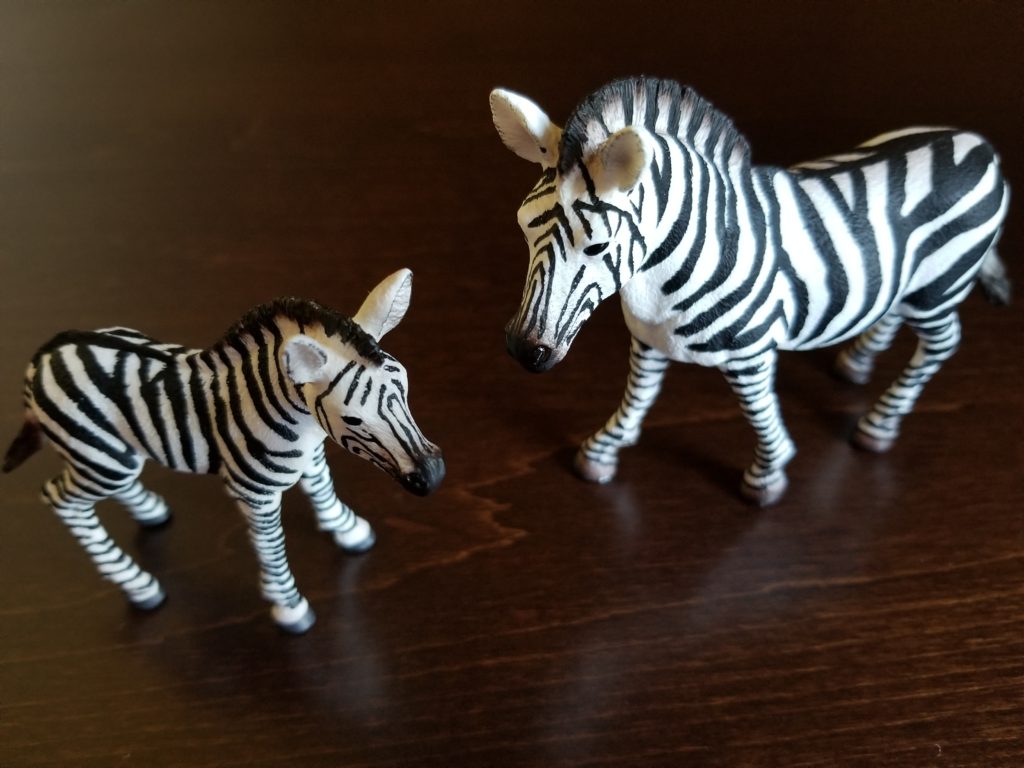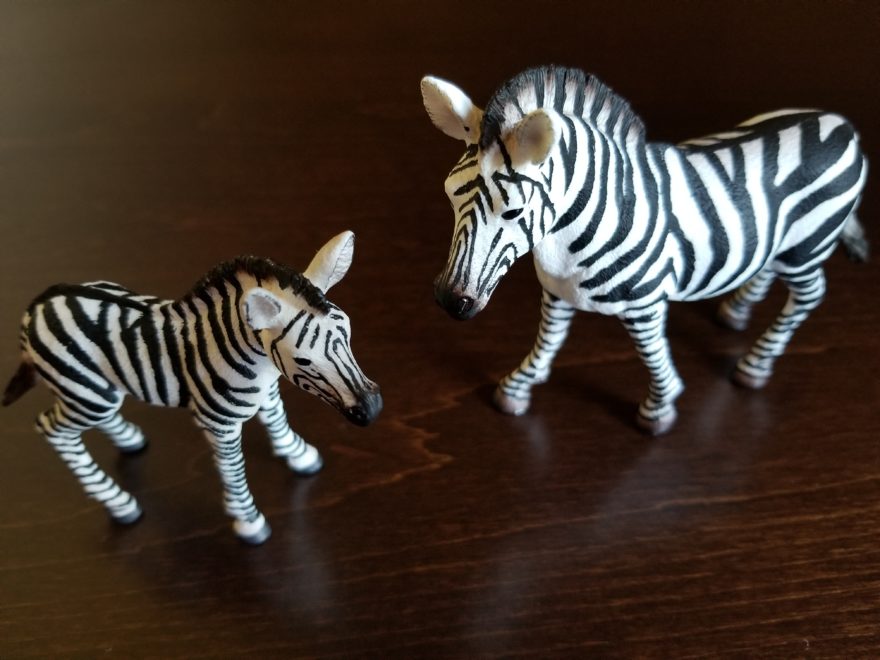When I started searching for information about rare diseases, and connecting with others facing the same types of issues that I was, many people seemed to be referring to themselves ‘zebras’.
This struck me as being a perfect word for us; a bunch – or herd! – of very diverse zebras, in a healthcare system designed for horses. Why do so many of us with – very different – rare disease self-identify as zebras? We’ve co-opted a term from medical education:
During my training at Hennepin County Medical Center (HCMC) in Minneapolis, MN, my mentor would use the following teaching pearl during rounds: ‘When you hear hoofbeats, think of horses not zebras!’… What did my mentor, the Sage of HCMC, mean by this? … Zebra is a medical slang term for a surprising diagnosis”(1).
Physicians are trained to look for ‘horse’ illnesses when diagnosing patients, because rare diseases are, well, rare. What this often means is that a person with a rare disease is faced with – in addition to the disease itself! – disbelief or doubt as to their symptoms.
The burden of proving that there’s something medically ‘wrong’ seems to fall on the patient, who usually doesn’t have the benefit of medical training. It can be a struggle to even find a physician willing to evaluate some – or all – of these symptoms.
I’m writing from experience here, as that’s exactly what happened to me; during a period of almost 3 months. And I’m considered lucky in that my struggle to be… believed… only lasted 3 months.
Many with rare diseases go years without a diagnosis, so also without treatment or medical support. Sadly, even within my field – bioethics, or medical ethics – some experts have taken a stance that’s unhelpful to zebras.
A good example of this can be found in a 2008 commentary, in a medical journal. It was written by Ezekiel J. Emanuel, MD, PhD and Victor R. Fuchs, MA, PhD. Dr. Emanuel is Chair of the Department of Bioethics at the National Institutes of Health (NIH). Dr. Fuchs is Emeritus Professor of Economics, and of Health Research and Policy, at Stanford University. They wrote:
Medical school education and postgraduate training emphasize thoroughness.
When evaluating a patient, students, interns, and residents are trained to identify and praised for and graded on enumerating all possible diagnoses and tests that would confirm or exclude them.
The thought is that the more thorough the evaluation, the more intelligent the student or house officer.
Trainees who ignore the improbable “zebra” diagnoses are not deemed insightful.
In medical training, meticulousness, not effectiveness, is rewarded”(2).
In case it’s not obvious here, they’re arguing against this approach, and using the term “zebra diagnoses” rather disparagingly. I’d like to counter that outlook with some of the reasons for which we rare disease patients use the term zebra to refer to ourselves:
- We’re often faced with situations in which we know more about our disease than our non-specialist physicians, because they’ve been trained to treat horses, not zebras;
- There are very few people who understand what it means to live with a rare condition; and
- We’re often told that there’s no solid evidence, information, statistics, or prognosis (i.e. likely outcome, or disease progression) available for our disease, because it’s too rare to have been studied.

So, what’s a unicorn? In keeping with the hoofed-animal analogy; if a zebra is someone with a rare disease, a unicorn is someone who has more than one rare disease. They’re the rarest of the rare, and many people – sadly this includes physicians – don’t seem to believe that they exist.
Because unicorns are even rarer, in healthcare systems built to deal with horses, they often face additional challenges and patient burdens. To complicate matters even further, many rare conditions are invisible diseases; the person looks perfectly fine, but has a life-threatening and/or debilitating disease.
These people are considered by the healthcare system to be disabled due to disease, but they may not look the part. This can be confusing to folks who don’t know any better.
One of the first rare disease patients with whom I connected, on Twitter, was a unicorn. Her two rare diseases were Ehlers-Danlos Syndrome (EDS)(3) and POTS, for Postural Orthostatic Tachycardia Syndrome.(4) The latter would cause her to very suddenly lose consciousness and collapse.
She’d often joke that she would always faint at the worst times, but it’s hard to imagine a good time to suddenly faint. We compared notes of times when we’d fainted in awkward situations; her from POTS and me from CRPS pain flares.
She also had a healthcare background(5), and wrote constructive criticisms of healthcare systems; how they could be adapted to better suit people who were ill. To improve healthcare, for patients. She used humour – often biting sarcasm – to get her point across.
At one point I sent her a photo of one of my favourite fridge magnets, which she adored: “Tact is for people who aren’t witty enough to be sarcastic”.
She gave me some of the best advice I’ve gotten so far, on how to deal with being a rare disease patient – adrift in a healthcare system (you can read about it in unicorn advice).
Often she’d send, or post, a funny photo that perfectly summed up something that had just happened – or was about to happen – in my own patient journey.
By now, you may have noticed that I’m referring to her in the past tense. Her name was Jess Jacobs, and she passed away on August 13th, just a few months after we ‘met’ on Twitter. She was only twenty-nine.(6)
Jess touched so many lives, and tried so very hard to improve healthcare systems for patients. She left a legacy of people – many of them working within healthcare – who’re trying to improve patients’ experience in her memory.
There’s a hashtag (#) on Twitter that’s living on in tribute, where people post stories of how they’re improving healthcare – or how they’d like to: #UnicornJess. Please drop by sometime.
I never had the opportunity to meet Jess in person, but wanted to write a tribute to her here, because of the profound impact she had on me. She was a seriously ill patient, yet took the time – via direct messaging on Twitter – to provide support and guidance.
At a personal level, one-on-one. Despite her own illnesses, she reached out when I was a newly-diagnosed rare disease patient; to help me to feel less adrift, less lost.
Thank you, beautiful unicorn, for the kindness that you shared with me, and with so many others. If I can someday help another person to obtain – or deal with – a rare disease diagnosis, it will be in large part because of you.
You’ll be dearly missed.
References:
(1) Michael Aaronson, MD. Common things are common, except when the diagnosis is rare. KevinMd.com blog. 07 Jan 2011. Web:
http://www.kevinmd.com/blog/2011/01/common-common-diagnosis-rare.html
(2) Emanuel EJ, Fuchs VR. The Perfect Storm of Overutilization. JAMA. 2008;299(23):2789–2791. 18 Jun 2008. doi:10.1001/jama.299.23.2789
https://jamanetwork.com/journals/jama/article-abstract/182076
(3) Genetics Home Reference. Ehlers-Danlos syndrome. National Library of Medicine (NLM), of the National Institutes of Health (NIH), at the U.S. Department of Health and Human Services (HHS). Undated. Web:
https://ghr.nlm.nih.gov/condition/ehlers-danlos-syndrome
(4) Genetic and Rare Diseases Information Center (GARD). Postural orthostatic tachycardia syndrome. National Center for Advancing Translational Sciences (NCATS), funded by the National Human Genome Research Institute (NHGRI) and the National Institutes of Health (NIH). Undated. Web:
https://rarediseases.info.nih.gov/diseases/9597/postural-orthostatic-tachycardia-syndrome
(5) Eytan, Ted. Remembering Jess Jacobs. 14 Aug 2016. Web:
https://www.tedeytan.com/2016/08/14/20174
(6) Combs, Veronica. Friends, colleagues share their memories of Jess Jacobs. MedCityNews (Breaking Media, Inc.). 18 Oct 2016. Web:

